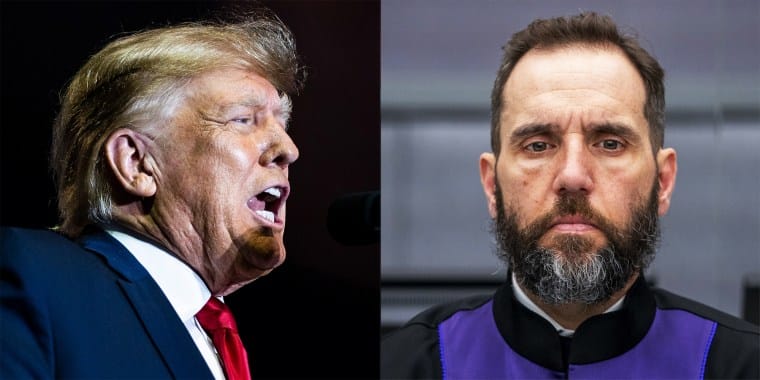Trump Pledges Immediate Dismissal of Special Counsel Jack Smith Upon Potential Re-election
In a recent interview that has sent ripples through political circles, former President Donald Trump has vowed to fire Special Counsel Jack Smith "within two seconds" of returning to the White House if he wins the 2024 presidential election. This statement marks a direct challenge to the legal
In a recent interview that has sent ripples through political circles, former President Donald Trump has vowed to fire Special Counsel Jack Smith "within two seconds" of returning to the White House if he wins the 2024 presidential election. This statement marks a direct challenge to the legal proceedings against him, led by Smith, who has charged Trump in relation to efforts to overturn the 2020 election and the mishandling of classified documents.
Trump's comments, delivered with characteristic bluntness, underscore his intention to leverage presidential powers to end investigations that might otherwise conclude in his legal accountability. Critics argue this move would represent an abuse of power, potentially setting a dangerous precedent for presidential immunity and the rule of law. Legal analysts have noted that while Trump could instruct the Department of Justice to dismiss Smith, the special counsel's removal might not be immediately straightforward due to the independent nature of his appointment by Attorney General Merrick Garland.
The reaction across social media platform X (formerly known as Twitter) has been divisive. Some users express alarm at what they perceive as an authoritarian move, fearing it could signal a broader assault on the justice system's independence. Conversely, Trump's supporters view this as him fighting back against what they believe are politically motivated charges. The sentiment on X ranges from outright support for Trump's actions as necessary to combat what they see as a biased justice system, to concern over the implications for democratic norms.
Trump's promise comes at a time when the legal battles against him are intensifying. Despite a case being dismissed by a Trump-appointed judge, the broader narrative suggests that his re-election could lead to the cessation of all charges against him, effectively using the presidency as a shield.
This development has reignited debates on presidential immunity, the balance of power, and the integrity of legal proceedings against sitting or former presidents. Political analysts suggest that if executed, Trump's plan could lead to immediate constitutional crises, including potential impeachment efforts if the opposing party controls Congress, arguing it would constitute obstruction of justice or abuse of power.
As of now, the political landscape remains deeply polarized, with Trump's stance on law enforcement and justice likely to feature prominently in the upcoming election cycle. Whether this strategy will sway voters towards viewing him as a defender against overreaches of legal power or further alienate those concerned about democratic erosion remains to be seen. This promise not only places the justice system in the center of political debate but also highlights the ongoing clash between legal accountability and political power in contemporary American politics.




